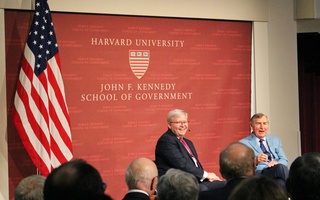Chinese President Xi Jingping may continue to centralize his power even as the country’s ideological balance remains constant, experts in international relations predicted at an event with Harvard’s Vice Provost for International Affairs Mark C. Elliott on Monday afternoon.
The panel, titled “China’s Future Leadership: An Instant Analysis of China’s 19th Party Congress,” is part of Harvard University’s Worldwide Week, a week of events designed to bring awareness to Harvard’s scholarship on a global stage.
Over the course of the event, the panelists discussed Xi’s politics, power dynamics within the Communist Party of China, and similarities between China's current leadership and previous party leaders, including Chairman Mao Zedong.
Edward Wong, a foreign correspondent for The New York Times and current fellow at the Nieman Foundation spoke about party power in the “post-Deng” era. Deng Xiaoping led China for more than a decade during the 1970s and 1980s.
“I think there is plenty of evidence to suggest that the party’s center, led by Xi, still has a very hard time imposing its will in a deeply effective and uniform way on local officials,” Wong said.
Government professor Elizabeth J. Perry drew comparisons between Xi’s initiatives to Mao’s policies, while also highlighting “worrisome” aspects of China’s “New Era” technological innovations.
“Technology is not only just a powerful tool for making information more publicly accessible, it’s also a powerful tool of censorship,” she said.
Huang Yasheng, a professor at the MIT Sloan School of Management, remarked on China’s shift from a “check and balance system” to a more centralized government.
“The 19th Party Congress is going to accentuate the centralization rather than reducing it,” Yasheng said.
“I believe the West also bears a responsibility for the rise of strongman politics,” Yasheng added.
Yasheng said the 2008 economic downturn and the election of President Donald Trump “have gone a very long way to dismantle the legitimacy of economic capitalism and political capitalism.”
Although most of the discussion was focused on China’s leadership and political trends, Perry also talked about the comparison between analyzing Chinese politics as an American and as a Chinese person.
“I think there is something to be said for the advantages of being outside a society, for seeing the big picture, for seeing it through different eyes,” she said. “But I also think there are real advantages to Chinese working within China, not only by being able to see up close-hand the nuances of Chinese politics, but also being the only people who are in a position to pass moral judgments and evaluations about their own politics.”
Read more in News
Chinese Billionaire Talks Entrepreneurship, Expeditions, and EducationRecommended Articles
-
On a Collision CourseIt has now been four days since a U.S. spy plane and a Chinese fighter collided over the South China
-
Summers Visits Chinese Universities, PresidentUniversity President Lawrence H. Summers returned last night from a five-day swing through China in which he addressed Harvard alumni,
-
Our China ChimeraMuch has been made of the fact that Meghan C. Howard ’04 interrupted Chinese Premier Wen Jiabao during his speech
-
 Former Asst. Defense Secretary Advises Path for U.S.-Chinese Relations
Former Asst. Defense Secretary Advises Path for U.S.-Chinese Relations -
China as PhantomThe connection between China and the American right has never been more public. China grows as the United States halts, representing both threat and opportunity for escapism.













